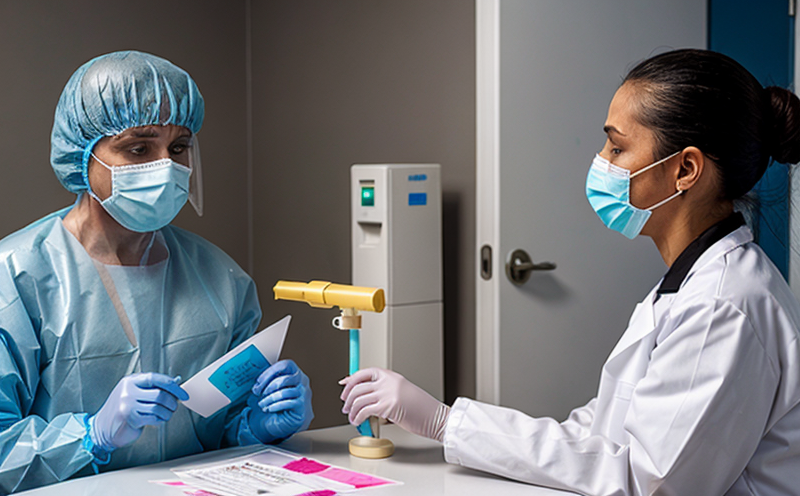Shigella spp. Detection Testing in Fresh Produce
The detection of Shigella species in fresh produce is critical to ensuring food safety and public health. Shigella bacteria are the causative agents of shigellosis, a diarrheal disease that can lead to severe complications if not treated promptly. Given the high volume of fresh produce consumed globally, it is essential for laboratories like Eurolab to provide accurate and reliable testing services to prevent outbreaks.
Shigella spp. are primarily transmitted through contaminated food or water, particularly when proper hygiene practices are not adhered to during harvesting, processing, packaging, or transportation. As a result, the presence of Shigella in fresh produce can pose significant risks to consumers. Therefore, stringent testing protocols and advanced detection methods are necessary to ensure that products meet strict quality control standards.
The first step in detecting Shigella spp. involves collecting samples from various points along the supply chain, including farms, processing plants, packing houses, and retail outlets. Samples can be taken from leafy greens, fruits, cut flowers, or any other produce that may come into contact with soil or water during cultivation.
Once collected, these samples undergo rigorous preparation to ensure accurate results. This process typically involves homogenizing the sample in a buffered peptone water (BPW) solution and then plating the suspension onto selective media such as Sorbitol MacConkey Agar (SMAC). SMAC promotes the growth of Shigella spp., while inhibiting other common bacteria.
The incubation period for identifying Shigella on SMAC is crucial, and it can vary depending on environmental conditions. Typically, plates are incubated at 35°C to 37°C for approximately 24 hours; however, some strains may require up to 48 hours of incubation. After this time, colonies that appear red or pink with a clear zone around them indicate potential Shigella spp.
To confirm the identity of these colonies, further testing is necessary using biochemical methods and serotyping. Biochemical tests include reactions like indole production, H2S formation, and Voges-Proskauer test, which help differentiate between different species within the genus Shigella. Serological typing uses antisera specific to O antigens; this step helps classify the strain into its respective serotype.
At Eurolab, we employ advanced molecular techniques such as Polymerase Chain Reaction (PCR) for rapid identification of Shigella spp. These methods offer faster turnaround times compared to traditional culture-based approaches while maintaining high specificity and sensitivity levels. Additionally, next-generation sequencing technology allows us to not only detect known pathogens but also identify emerging strains that might evade conventional detection.
The importance of accurate and timely Shigella spp. testing cannot be overstated. Properly executed tests can prevent contamination from reaching consumers, thereby safeguarding public health. By partnering with Eurolab for your Shigella spp. detection needs, you gain access to state-of-the-art facilities, experienced scientists, and cutting-edge technologies that ensure consistent quality assurance throughout the supply chain.
Our commitment extends beyond mere compliance; it encompasses proactive measures aimed at enhancing food safety standards across industries. Through continuous improvement initiatives and adherence to international standards like ISO 17025 for laboratory accreditation, Eurolab ensures that every test conducted is reliable and meets regulatory requirements.
Applied Standards
In accordance with recognized global guidelines, our Shigella spp. detection testing aligns closely with several international standards:
- ISO 17025: This standard ensures that laboratories maintain high levels of technical competence and quality management systems.
- AAMI T46: This standard specifies procedures for the isolation and identification of Shigella species in clinical samples. While primarily focused on medical contexts, its principles are equally applicable to food safety testing.
- ASTM E2571: This document provides guidance on the use of selective media like SMAC for detecting coliform bacteria, which includes some strains of Shigella. Although not specifically tailored towards Shigella, it supports our methodological approach.
- IEN 9321: This European standard outlines specifications for the performance of microbiological laboratories involved in food safety assessments. Our adherence to this standard underscores our dedication to maintaining robust quality assurance practices.
These standards form the backbone of our rigorous testing protocols, ensuring that all results are accurate, reproducible, and compliant with current regulations.
Eurolab Advantages
Partnering with Eurolab offers numerous benefits for those seeking reliable Shigella spp. detection services:
- Expertise & Experience: Our team comprises highly trained professionals who possess extensive knowledge in microbiology and food safety.
- State-of-the-Art Facilities: Equipped with the latest instrumentation, our labs provide an environment conducive to precise testing.
- Rapid Turnaround Times: Leveraging advanced technologies like PCR and next-generation sequencing, we deliver results faster than traditional methods.
- Comprehensive Reporting: Every test comes with detailed reports that outline findings alongside actionable recommendations.
- Dedicated Client Support: Our dedicated customer service representatives are available to assist at any point during the testing process.
- Continuous Improvement Initiatives: We regularly update our methodologies based on feedback and technological advancements.
Our unwavering commitment to excellence translates into superior service for all clients, regardless of their specific needs or scale.
Why Choose This Test
Choosing Eurolab's Shigella spp. detection testing offers several compelling reasons:
- High Accuracy: Utilizing established techniques and cutting-edge technologies, our tests yield highly accurate results.
- Compliance Assurance: Ensuring that your products meet stringent regulatory requirements reduces the risk of recalls or legal issues.
- Cost Efficiency: By preventing contamination early in the supply chain, you minimize costs associated with recall and reprocessing.
- Better Reputation: Demonstrating a strong commitment to food safety enhances your brand image among consumers and stakeholders alike.
- Informed Decision-Making: Armed with precise data about potential contaminations, decision-makers can implement targeted interventions more effectively.
- Global Recognition: Eurolab's certifications and affiliations provide assurance that our services meet international standards.
By selecting us for your Shigella spp. detection needs, you invest in a future where trust and transparency are paramount.





